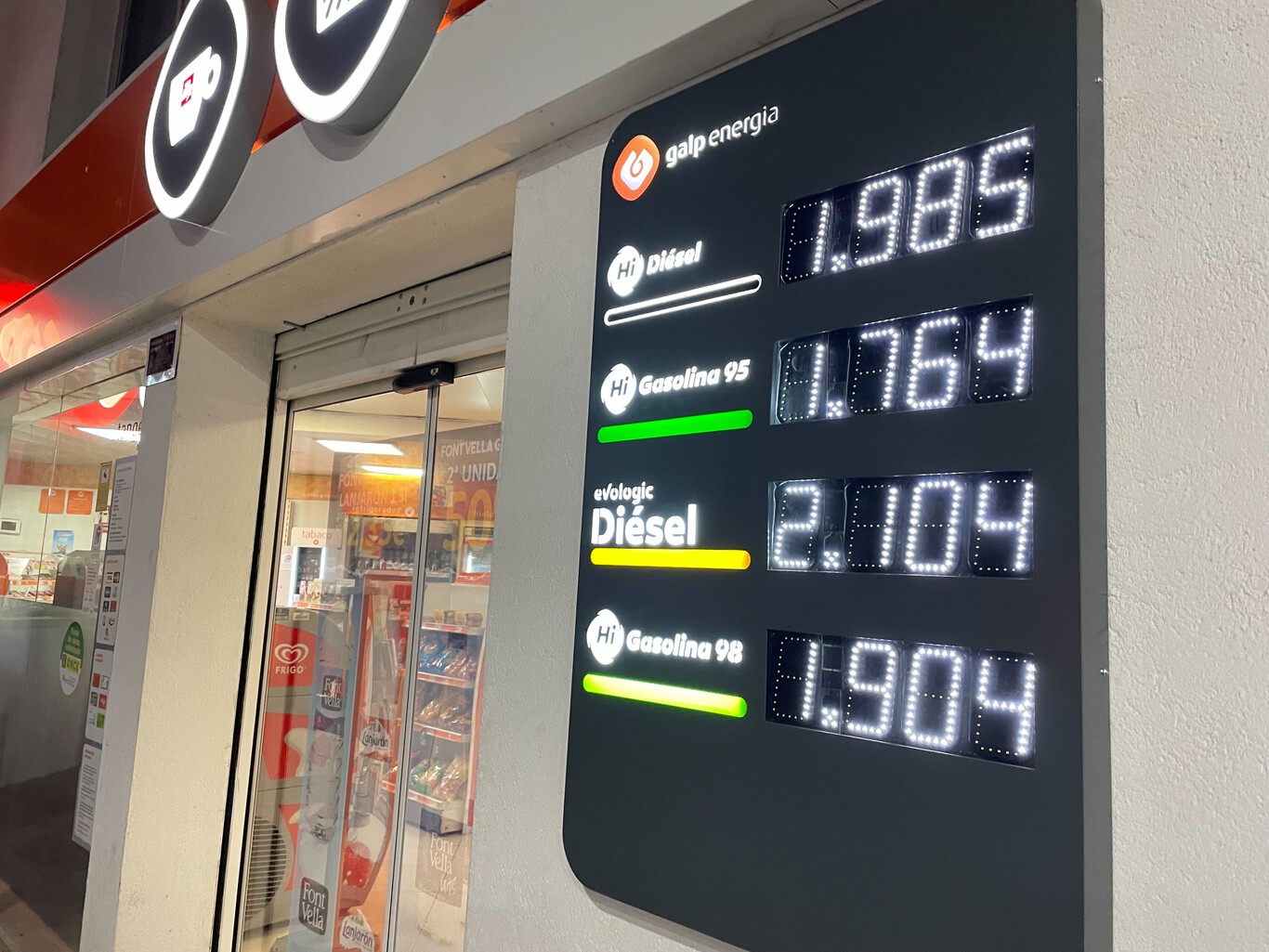
Fossil fuels are expensive. Very expensive. Especially if we look back more than a year. So expensive that refueling a liter of diesel costs, in practice, the same as 98 gasoline, its most expensive product. That is, diesel is no longer only more expensive than gasoline. The most expensive gasoline is at the same price as diesel. What happened?
The prices. Today, the average cost of gasoline in Spain is €1,746/l and €1,912/l for diesel. Some especially striking figures if we take into account that the price of 98 gasoline is €1.913/l. That is to say, in the Spanish average, with data collected by dieselogasolina.com, refueling a liter of diesel is as expensive as one of gasoline 98.
If we look back, the figures are especially striking. A year ago, gasoline had a price of €1,466/l. Diesel was almost 80 cents cheaper, costing €1,335/l. Two years ago, the price was €1,162/l for gasoline and just €1,029/l for diesel. All are data from the weekly bulletins compiled by the European Union with the average prices provided by the countries.
unthinkable. That diesel could be more expensive than gasoline was unthinkable a year ago. In March, however, the price of diesel exceeded that of gasoline for the first time in our country. An abnormal situation that a few months later was redirected to what we are used to.
In recent weeks, the price of diesel is not only more expensive than gasoline. Putting in a liter of diesel today is as expensive as using 98 gasoline for our cars. A product that, contrary to what is stated in some forums or can be read on the net, will not make our car work better. Diesel A + is even more triggered and is already paid above the barrier of two euros per liter. Although far away, both categories of diesel are already pointing to their all-time high.
And it’s not a tax problem. It is the usual mantra when we talk about fossil fuels. Taxes. The fact that half of what we pay with each liter of fuel goes to the State has long ceased to be a reality. Two years ago, 54% of what we paid for diesel was taxes. A year ago it was already 46%. Today it is 38% (according to the latest European report). Spain is one of the countries where the least tax on diesel is paid in Europe.
This is because VAT (21%) increases its collection as the price of fuel increases, but the rest of the tax, the Special Tax on Hydrocarbons, both in its Special section (7.2 cents/liter) and the General (0.307 euros/ liter) is invariable. With the updated data, in Spain €0.711/l of taxes are paid for diesel (37.2%). With each liter of this fuel, €1.20/l is directed to pay the cost of the raw material, its distribution, and the profit margin of the oil companies and service stations.
Does nobody win? The profits and profit margins of oil companies and service stations are constantly questioned. The State subsidy of 20 cents/liter was absorbed so quickly in the distribution that the Government even considered its withdrawal. According to El País with data from the CNMC, the profits of gas stations have increased to 21% in recent years. Their employers assure that the margin is barely 2%.
With updated data, the CNMC has confirmed that during April, the gas stations increased their profit margin to the point of eating up the state aid. In a said month, diesel increased its profit margin by 4.98 cents/liter. In the same period, gasoline increased by 1.15 cents/liter. And Spain is not the only country. The United States, the United Kingdom, and Germany opened investigations for excessive increases in the price of fuel.
The price of diesel It is worth asking, then, what has caused this fuel to become so expensive. In addition to the Barrel of Brent, which OPEC wants to maintain at 100 dollars/unit, pressing the market with a lower offer, the price of diesel is more linked to the price of refined products. The Spanish Association of Petroleum Product Operators (AOP) did not make the causes clear a few months ago. “It can affect a drop in supply – a technical stoppage at a refinery, for example – or an increase in demand,” they told El País.
The truth is that Europe has found itself at a dead end with the ban on Russian oil. The fuel that arrived from Russia was already refined and the prices of the European refineries could not compete with those offered from the East. Added to the drop in supply during the coronavirus lockdowns, a multitude of refineries on the continent ended up closing.
However, with the demand recovered and Russia out of the game, the European refineries are a funnel that is not enough. Excess demand has caused the price of the product to skyrocket. Repsol’s refineries, for example, multiplied their profits by 15 in records for July, compared to the same period of the previous year. Galp, Shell, and Exxon Mobile have also multiplied their benefits.
Against a rock and a hard place. The consumer is, as always, the most affected by the situation. At the moment, in Spain, we will have a diesel and gasoline subsidy until December 31, but it remains to be seen when its withdrawal will begin to be considered. This may be the new normal and withdrawing it will trigger its price even more, although it especially benefits high incomes.
Over time, the market should lead to lower demand for diesel. The European Union has decided to choose to electrify the automobile market, this is a direct bet in the medium term for gasoline. But, at the same time, buying a car is becoming more expensive, which means that second-hand cars over ten years old, the vast majority of which are diesel-powered, are the ones with the highest sales volumes.
If these steps are taken, service stations will need to raise the price of fuel to lower demand. The European Union is determined to pursue diesel over gasoline (a good example are the DGT labels and its circulation restrictions) and although it has not been talked about for a long time, increasing its taxes is already something that has been put on top of the table.

Sharlene Meriel is an avid gamer with a knack for technology. He has been writing about the latest technologies for the past 5 years. His contribution in technology journalism has been noteworthy. He is also a day trader with interest in the Forex market.











